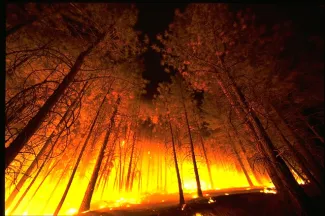
More summer smoke? Experts monitor climate-fueled events and health effects
Click play to listen to this article.
(Minnesota News Connection) Wet weather this spring has improved drought conditions in Minnesota and southern Canada. However, experts remain on alert for increased wildfire activity and other climate changes affecting people's health.
Poor air quality was a frequent topic last year in the upper Midwest, as smoke pushed down from Canadian wildfires. Researchers said climate change is fueling hotter and drier summers, making forests more susceptible to large fires.

Dr. Bruce Snyder, co-founder of Health Professionals for a Healthy Climate, worries about a repeat summer of thick, hazy smoke in the air creating unhealthy conditions.
"When that happens, people have more respiratory disease; people who have chronic lung disease tend to get sicker," Snyder explained. "There's a lot of downstream consequences for people all over the world, but certainly here in Minnesota."
Snyder noted the transition to cleaner energy sources is complex, but acknowledged pollution events place more emphasis on the need for less reliance on fossil fuels, due to their contributions to a warming planet. The Minnesota Pollution Control Agency said the state has had 46 air quality alerts since 2015, and 34 of those were because of wildfire smoke.
Snyder emphasized it is not just air pollution from wildfire smoke to worry about. He pointed out there are other ways a person's health can suffer from climate change.
"We've got many more dangerous insects -- ticks, mosquitoes, and so forth," Snyder stressed. "This is having a profound effect on our wildlife. But also, we're seeing a lot more progressively rising rates of Lyme disease, of West Nile virus."
Year-over-year statistics may vary, but state health officials say the median number of Lyme disease cases has risen in the past decade. Snyder added adverse health effects of climate change can be much harder for populations lacking stable housing.
















